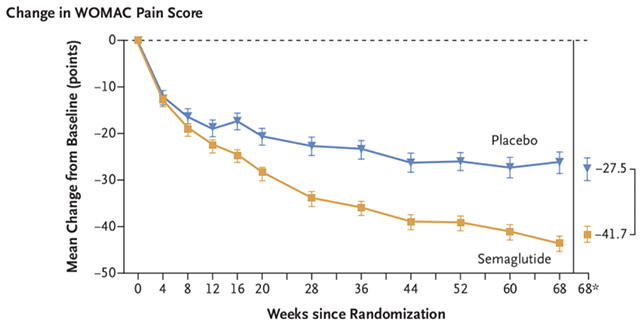The drug semaglutide is already proving incredibly effective at tackling diabetes (under the brand name Ozempic) and weight loss (as Wegovy), and a new study suggests it could also work wonders for a kind of crippling knee pain.
In a Phase 3 clinical trial, an international team of researchers found that a weekly dose of 2.4 milligrams of semaglutide was significantly better than placebo treatments for relieving knee osteoarthritis pain, reducing weight and improving power to perform physical activities such as walking.
For some participants, the pain reduction was so drastic that they were effectively “treated outside the study,” rheumatologist Henning Bliddal of Copenhagen University Hospital in Denmark said. Nature. It is a ray of hope for the hundreds of millions of people with knee osteoarthritis.

The arthritic condition occurs when the protective cartilage in the knee joints wears away, causing pain and stiffness that can be quite severe. Obesity is a major risk factor for knee osteoarthritis, and losing weight can help reduce pain – two good reasons why the researchers wanted to look at semaglutide.
Semaglutide is a so-called glucagon-like peptide-1 receptor agonist (GLP-1RA): essentially it mimics the GLP-1 hormone produced when we eat, tricking the brain into thinking we are full.
That will help with weight loss, but the drug is also an anti-inflammatory, calming overreactions of the body’s immune system that cause swelling and tissue damage – which helps explain the reduction in pain.
On average, body weight decreased by 13.7 percent in the group receiving semaglutide, compared to 3.2 percent receiving placebo, while reported pain scores decreased by 41.7 points and 27.5 points respectively (the pain scale used ranges from 0 to 96).
A few caveats should be noted here: the study was funded in part by Novo Nordisk, a manufacturer of semaglutide. Even though participants received advice on diet and physical activity during the trial, the extent to which this advice was followed was not monitored.
It is also worth keeping in mind that semaglutide in its various forms is an expensive drug, and weight can quickly increase if doses are stopped. Getting people to use the drug long-term can be a challenge.
Despite these problems, the study results offer much promise for future treatment of knee osteoarthritis and its associated debilitation. There are currently treatments available, but they often come with limitations or side effects.
Those with the condition are often in a bind: knowing that physical activity and exercise can help them lose weight and improve their symptoms, but also that they are in too much pain to actually do anything about it.
“Weight reduction along with physical activity is often a recommended approach to control painful symptoms, but adherence can be a challenge,” says Biddal.
The research has been published in the New England Journal of Medicine.



